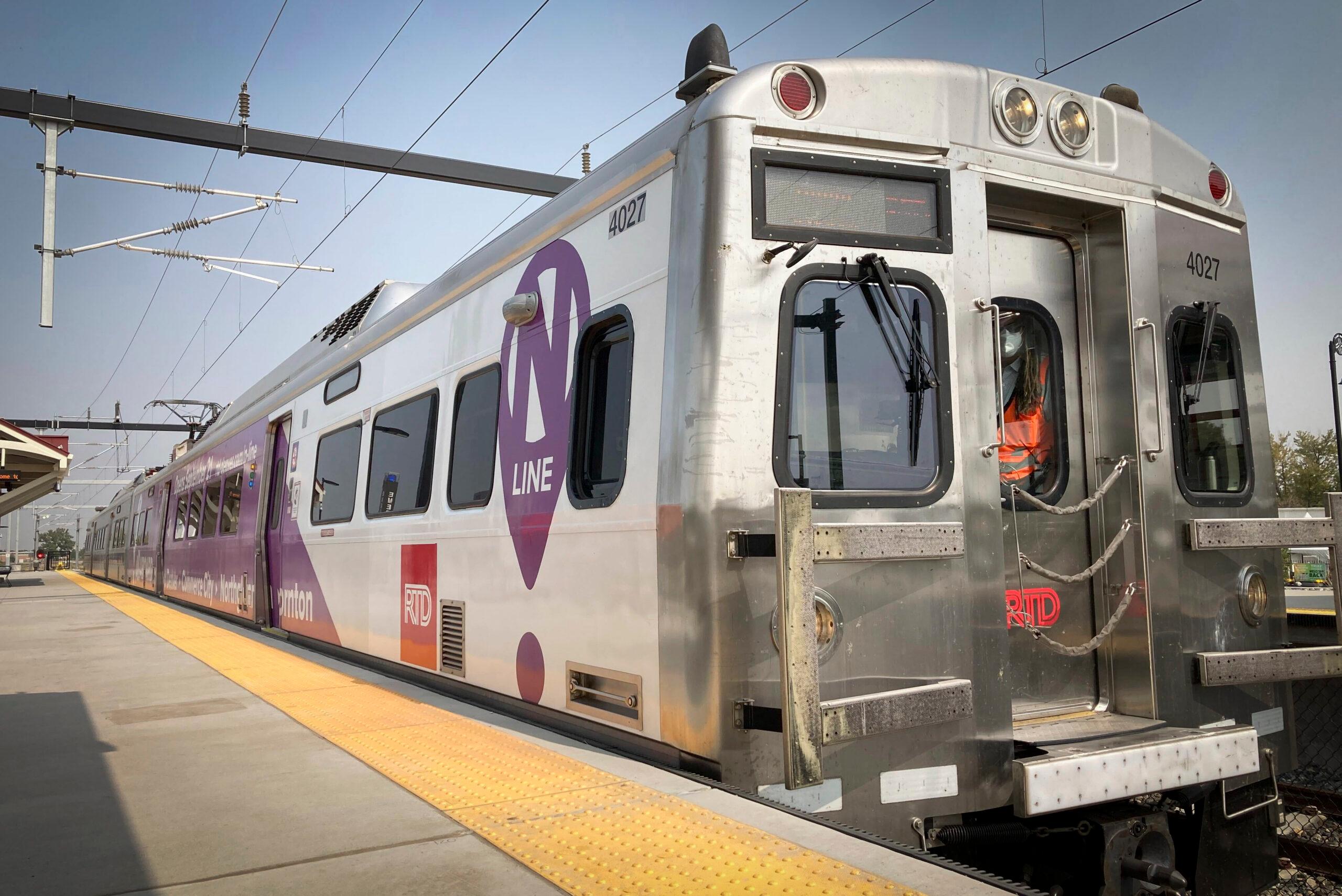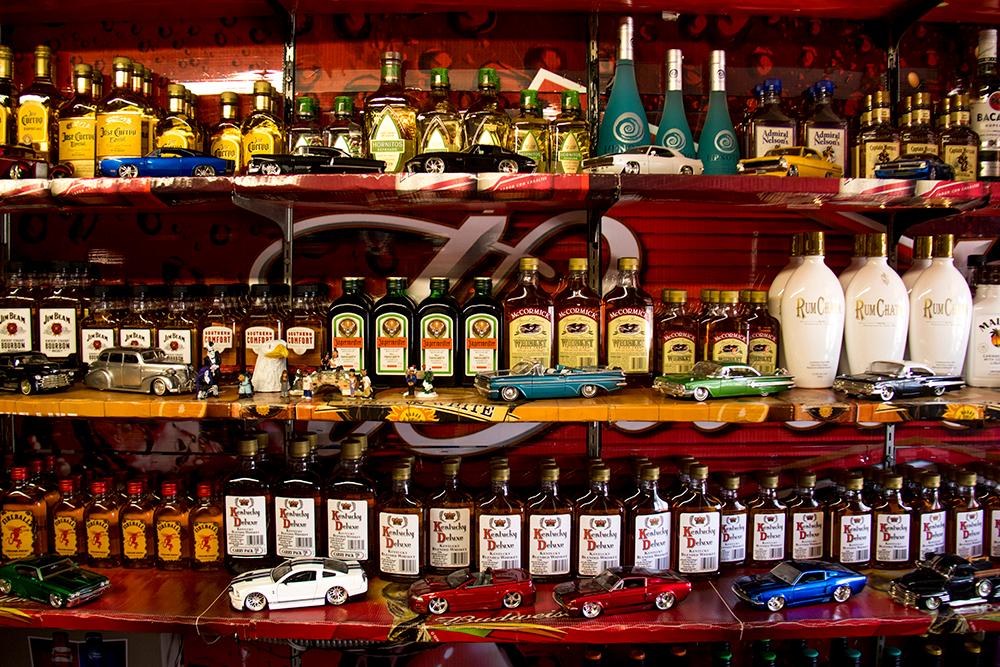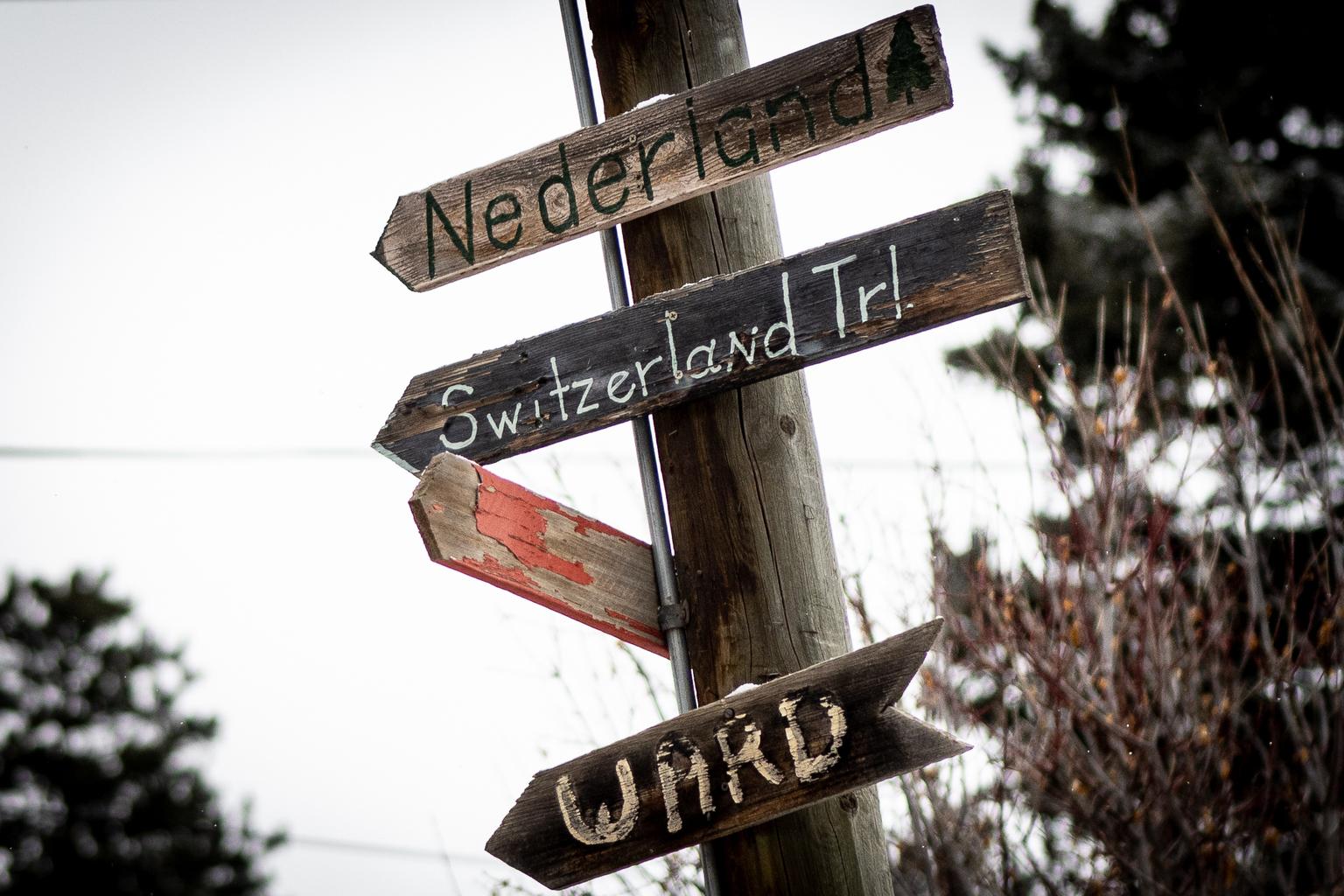
As the state considers a bill that would raise revenue for the Colorado Department of Transportation, Gov. Jared Polis said the Regional Transportation District is not a part of it.
“I, and many others at the state level, are not always happy with everything RTD does,” Polis told Colorado Matters. “So we’re certainly not about to give them money, but the state absolutely supports local transit.”
RTD receives its funding from the eight counties within the tax district where it operates. Instead of additional money from the state, Polis said Colorado’s largest public transit system needs reform.
“While I wish RTD the best — and I know there’s a number of bills, and I hope to sign one that will allow them to compete and do better — they certainly don’t have a monopoly on public transit,” he said.
Interview Highlights
On COVID vaccinations:
“Right now, we’re still in the situation where demand exceeds supply. And that can be frustrating for people who might not be able to get an appointment for a week or two weeks. And I get that, but we’re not that far away … We’re probably only about a month away, late April, early to mid May. We’ll be in a situation where supply exceeds demand. And that’s when we will really need to work hard on outreach to our peers, really involving people’s family, doctors and personal physicians and other ambassadors that are trusted in different communities to get out the word about this amazing triumph of modern science.”
On statewide gun control:
“I think when we look at true measures to keep people safe, it’s always better to do things at the federal level. Let’s take Colorado’s background check as an example … anybody who doesn’t pass a background check in Colorado can drive to Wyoming and, in an open air gun show, purchase a weapon without a background check. So we absolutely need a national background check system. It doesn’t mean we shouldn’t fix what we can, but of course, I support the efforts of President Biden and others to help reduce these kinds of mass shooter events.”
On wildfire mitigation:
“Well, it's really a bit of a shift in firefighting strategies over the last decade. So traditionally... a fire is run locally, which means by a county sheriff, local fire district, until it meets a certain threshold where it involves the state. What this means is the state needs to get involved earlier, very proactively, to defeat fires before they spread to fires of state concern. And we're going to be investing resources with our new Firehawk helicopter, it'll be delivered next year, but we're leasing one for this fire season. I signed a bill with additional resources that'll help invest in mitigation and response.”
Read The Transcript
Ryan Warner: “Governor, thanks for being with us again.”
Jared Polis: “Always a pleasure, Ryan.”
RW: “You recently loosened the statewide mask mandate, which prompted a lot of questions from our Twitter followers. Some ask if it's necessary to have a mandate at all, while others wonder why masks wouldn't be required across the board, especially in light of a recent surge in Pueblo and Jefferson counties. Why is your policy allowing ‘low incidents’ counties to go maskless, the right approach?”
JP: “Well, we renewed the mask requirement for the whole state. It just takes a slightly different form in different counties. So in every county in the state, students are wearing masks in school, we don't want to jeopardize the successful return to school in Colorado. Personal services, haircut, massage, those are mask-wearing. There are a number of smaller counties in the state where there's very low incidence of the virus, so they no longer have that mask requirement just if they're casually around others, it's only in those more intimate circumstances that it applies. But what's important is no matter what your city or county requires for mask wearing, is that you simply wear a mask. You make the right choice for yourself. When you're around others, especially if you're not vaccinated, the smart thing is to wear a mask. And as people get vaccinated, you can absolutely let up on that a little bit, you don't have to worry about that as much. But until you're successfully vaccinated, which means 15 days after your second vaccine or in the case of Johnson & Johnson, 15 days after your first and only vaccine, it's really important now more than ever to wear masks. Hospitalizations are going up and we're seeing a surge across the country in COVID and hospitalizations.”
RW: “I just want to point out, you both have had COVID and I believe, have been fully vaccinated. Against that backdrop, I ask, how long you personally plan to wear a mask when you're outside your home?”
JP: “That's a good question. I still do it. As a role model, I want to set it. It's never been required in the town I live in, Boulder, outside, but I do wear it whenever I walk the dog, and I do that religiously because I know that people see me and it's important that I wear a mask. So I do wear a mask and I plan to keep that up at least for the next month or so. And I can say, as somebody who's both had COVID and somebody who's had the vaccination, it is much worse having COVID, please get vaccinated. Your arm might be a little sore the next day, you may have a headache, but COVID is far worse. As you know Ryan, my partner Marlon was hospitalized for two days, I lost some smell for a while, it was not fun. The vaccine is quick and easy, you don't even have to get out of your car, if you want to do it at a drive-through site, it's super easy to do, and you can get it at your local pharmacy too.”
RW: “As you look at vaccinations statewide, are there pockets of hesitancy or avoidance that are concerning you?”
JP: “Well, right now we are still in the situation where demand exceeds supply. And that can be frustrating for people who might not be able to get an appointment for a week or two weeks and I get that. But we're not that far away, Ryan, we're probably only about a month away, late April, early May, early to mid May, we'll be in a situation where supply exceeds demand. And that's when we really need to work hard on outreach to our peers, really involving people's family doctors, and personal physicians and other ambassadors that are trusted in different communities, to get out the word about this amazing triumph of modern science.”
RW: “I mean, it's interesting, you say demand exceeds supply. I'll just reveal a little bit of a personal adventure I had, which is that I was able to find an orphan dose in a place where people are not necessarily bending over backwards to get the vaccine. So it's not an entirely black or white picture here is it?”
JP: “Well, I would say we get about four to 500,000 doses a week for the state of Colorado, from the federal government. We're grateful for that, it's up from 100,000. But what I can tell you, Ryan, is that if we got seven or 800,000 in a week, we would be able to use all seven or 800,000.”
RW: “That is the gap between demand and supply statewide. Lots of attention this week on baseball's All-Star Game coming to Colorado, but I actually want to ask you about basketball and hockey. The Nuggets and Avalanche got permission from your administration to host fans indoors. The teams owners say they worked with the state, the CDC, the NBA, the NHL on safety protocols. Governor, we know COVID-19 is spread in the air, we know the indoors are riskier than outside, ventilation can be an issue. I'm thinking also of singing and screaming and droplets. I mean the national anthem, for instance, people with masks off as they drink beer. Is this a wise decision to have indoor sporting events?”
JP: “Well, we're at a situation Ryan, where a quarter of our adult population is immune. And absolutely, I've been vaccinated and I've had COVID, I probably get more immunity from the vaccination, I wouldn't hesitate to go to a Nuggets game or an Avs game, and anybody who's vaccinated should absolutely feel comfortable doing that. If you're not vaccinated, absolutely you're taking a risk, you have to choose what kind of risks you're comfortable with. I personally would not go to a game if I wasn't vaccinated, I wouldn't even feel comfortable necessarily going out to eat in a restaurant, if I wasn't vaccinated. Now I have been vaccinated and I have been out to eat in a restaurant, it's great. And it's wonderful to see so many folks re-emerging, especially people in their sixties and seventies that have taken such extreme precautions and seeing them enjoying indoor dining again and hopefully they're out cheering on the Nuggets as well.”
RW: “It's an interesting thing to say, if you've been vaccinated. Can you foresee a scenario in which Colorado only allows tourists in or into certain places, if they can prove that they've been vaccinated, a kind of passport, that's how this has been referred to. Any conversations in your administration about something like that?”
JP: “Well, it wouldn't be coming from the state or from us. I mean, there might very well, I've heard airlines talking about it, they require tests for international flights, maybe they won't require a test if you're vaccinated. I think you might see some instances of that in the waning days of the pandemic, but there's not a long period of time here till everybody who wants to be vaccinated, will be vaccinated. I mean, we really are expecting that by the end of May, which means immunity by the end of June. So we're only a couple of months off from that date.”
RW: "Okay. You do not see something like that coming from state government in other words?”
JP: “No, it wouldn't come from state government. I mean private businesses are able to do what they want. I think I read an article that there was some Denver bar looking at doing that and having people who were vaccinated and then they could pack them in more and I don't know who else will want to do that, but you know, it just sort of operates by the laws of the marketplace, it's consumer demand. I mean, if consumers value a safe place where they know that everybody around them is vaccinated, then I guarantee you the market will deliver on that kind of location. If consumers feel comfortable enough being vaccinated themselves and not worrying if only 80 or 90 percent of the people around them are vaccinated, then the market won't deliver on that. It's really just a question of what consumers want.”
RW: “You have struck, I think so far, a very optimistic tone. I do want to say that the CDC announced the detection of the P-1 variant in Colorado. This is the strain that has devastated Brazil. How worried are you that variants could upend all of the progress that you've spoken of so far?”
JP: “Well, it seems likely that the reason that we have an uptick now in our state, in hospitalizations, in cases is because of the variants, as well as across the country. So this is a race against time, which is why I want everybody listening to get vaccinated as soon as you can. It's free, there's no cost, it takes 15, 20 minutes. Probably takes you longer to sign up than it does to get the vaccine. And if you do sign up on a list, you'll get your chance in the next week or two or three, at the local hospital, local pharmacy. So far Ryan, and obviously my optimism is predicated on this, the vaccine is highly effective against all the variants that have been detected. And as long as that's the case, then I'm comfortable that the end of the pandemic is in sight, really late May, early June.”
RW: “And so you've seen enough evidence that you think the vaccines are strong enough against that P-1 variant?”
JP: “That's what's been observed so far, that the vaccines are still highly effective. There's some evidence that they have slightly decreased efficacy against some of the variants, but as long as you're talking to the 80 percent, 90 percent range, you still have an extremely, highly effective vaccine.”
RW: “Gov. Polis, to guns. After the mass shooting in your hometown of Boulder, there are moves at the state and federal level, to try to prevent more mass shootings. Here in Colorado there's been talk of a state level assault weapons ban. But a prominent lawmaker on this issue, Tom Sullivan, who lost his son in the Aurora theater shooting, recently told my colleague Bente Birkeland this about a state-specific ban: “Well, I mean, it diverts all of the attention. I mean, if we were to ban something here, I mean, it'd be very easy to go to any of the surrounding states.” Governor, do you want to see a state level ban on assault style weapons?”
JP: “Well, I think what you need to do is have a discussion about what would have the biggest impact on keeping people safe. And if you look at this case, as you know, I live in Boulder, I've been to that King Soopers many times in South Boulder, it's not my primary grocery store, but when I'm in South Boulder, I often go there, there's a number of issues that arise. One is simply the issue, hey, here's somebody who had a conviction for a violent offense before, why was he able to buy a gun? Forget about the type of gun, let's look at the classification of violent offense that prohibits you from purchasing a gun, at least for a period of time, maybe a decade, maybe five years, many offenses do, why did his violent offense not preclude him from purchasing any gun? Another issue is our red flag law. Our red flag law that I signed into law, could have been used in this instance, family didn't know about it. We need better outreach. It's been mostly used by law enforcement, we'd like to make sure that families knew about it. When parents see their kid with a gun, and they're worried about their mental state and they're showing signs of risk, an extreme risk protection order can be a great tool. And it should be something that, especially when a kid is 18, 19 or 20 or 21, when they're under 18, the parents can simply take the gun, but if they're 19 or 20, what recourse did the parents have, if they're worried about their own kid causing immediate harm to their self or others? We do have a law, but that doesn't do us as much good if people don't know about how to use that law. And I'd like to see more outreach on that.”
RW: “Is it important to you that there be a ban on assault weapons at the state or at the federal level?”
JP: “Well, I think when we look at true measures to keep people safe, it's always better to do things to the federal level. Let's take Colorado's background check as an example, and I do think we should fix it, from the learning from this instance about what types of violent crime preclude you from buying a gun. But you know what, anybody who doesn't pass a background check in Colorado, can drive to Wyoming and in an open air gun show, purchase a weapon without a background check. So we absolutely need a national background check system, it doesn't mean we shouldn't fix what we can, but of course I support the efforts of President Biden and others, to help reduce these kinds of mass shooter events.”
RW: “And you served in Congress, so I imagine you had some perspective on this. Do you think that there should be a reinstatement of what had been in place, a federal assault weapons ban?”
JP: “Oh, when I was in Congress, I did support that effort to reinstate that and if we can do that nationally. First of all, the background check, it was very important in fixing that. In Colorado, we took a different route. We limited the magazines, which in effect prevents high-speed weapons from having magazines of greater than 15, purchased legally. Of course they can still be purchased illegally, just as the weapon itself could.”
RW: “I'll just say that the president announced Thursday, he'd sign a series of executive orders that would make weapons using a stabilizing brace, subject to the National Firearms Act. This was the accessory the suspect apparently used in the King Soopers shooting. Biden also wants to pave the way for states to pass red flag laws, which as you have mentioned, Colorado has. And a Biden wants more regulation of so-called ghost guns. When it comes to a state level assault weapons ban, do you think that's the right approach in Colorado right now?”
JP: “Well, look, I think that what we should do is probably make the changes that would save the most number of lives and reduce the likelihood of these kinds of instances of gun violence. And what is striking from this case, is how was this young man, who had a prior history of violent offense, able to legally buy a gun? I think he had two guns, right? I'm not concerned about the model of the gun at this point, why was he able to buy a weapon when he had a recent conviction for a violent offense? So I think some real diligence and looking into that, could help prevent this kind of thing from happening again, as well as doing a better job publicizing the resources that are available to parents and loved ones in the form of the extreme risk protection order or red flag law.”
RW: “Let's talk transportation. The general assembly is considering a proposal to raise $4 billion over the next decade for transportation. In addition, President Biden is pushing a massive bill that would pour money into the country's infrastructure. Given that transportation is a huge contributor of greenhouse gases, how will climate change guide the choices your administration makes when it comes to these investments?”
JP: “Well, I haven't fully studied the federal package yet, although I understand it has some strong green components as well, but I can talk with some knowledge about at least the draft of the state proposal, which includes what we call multimodal transportation, which means bus and increased light rail and train. It includes charging stations and electric vehicle infrastructure, as well as making sure we have the state of repair money needed for lanes and roads and bridges, which even electric vehicles rely upon. So when you look at what's been happening in transportation and why Colorado has so much traffic and poor road quality, it's a confluence of several factors. One is simply increasing population, increased utilization, but that's coupled with decreased funding. Why decreased funding? It's because vehicles are more fuel efficient, and there's now electric vehicles and they pay less and less of the gas tax that funds our roads. So we need to fix that, and we also need to provide some relief to motorists and their pocketbooks up front. That's why my priorities include either lowering the gas tax or lowering the vehicle registration fee. And I think the drafts include lowering the vehicle registration fee, which would save Colorado motorists over $90 million over the next two years.”
RW: “I think there are concerns, particularly about whether this would be invested into highway widening projects. For instance, Ben Harris of Denver asks on Twitter: How are widening highways in the state's climate goals, congruent? Speaking of the $1.5 billion of raised revenue, potentially from the legislature that will go towards highways.”
JP: “Well, we want Coloradans to not have to waste as much time in traffic. The average economic costs of the time that you or I spend lost in traffic, Ryan, is about $650 per person in this state. That's how much time we lose, economic time. That doesn't even take into account this sort of priceless cost, how do you even put a price tag on missing your kid's soccer game or missing a church service because you were stuck in traffic, those things don't have an economic price, but they're every bit something that Coloradans suffer from. So we need to improve this, and of course, what makes a difference in reducing our air pollution is the conversion to electric vehicles, and a transportation modernization plan, like the one being worked on by Senator Fenberg, Speaker Garnett, Senator Winter, Representative Gray, will accelerate the transition to zero emission and low emission vehicles. And I think that's a net plus for air quality, as well as reducing traffic for all of us.”
RW: “So you really see electric vehicles as the catalyst here, rather than catalytic converter. Okay, that's a terrible pun. But that is to say, I don't hear you talking necessarily about transit as central to this. And I just want to note that our transportation reporter, Nathaniel Minor, told Avery Lill this week, that in the state proposal, there isn't any money for Colorado's largest transit agency, RTD.”
JP: “Well, RTD is not something that is run by the state. And right now, I, and many others at the state level, are not always happy with everything RTD does, so we're certainly not about to give them money. But the state absolutely supports local transit. And that means bus service, it means Bustang, the Skistang service that we launched, a number of others that would be beefed up through this transportation proposal. RTD is not a statewide thing, it's just certain counties that are in it, they have their own tax base that funds them. We are looking at a statewide picture and yes, absolutely, transit is part of modernizing transportation across the state.”
RW: “But how can you say that if the largest transit agency in the state wouldn't benefit from these state dollars?”
JP: “Well, what they need is reform not money and they're getting quite a bit of money from the federal government. I'm excited they're now working on the plans for delivering on some of their promises. But that's not a statewide entity. When we talk about modernizing transportation, funding for roads and bridges, we're talking about across our entire state, for Highway 70, for Highway 25, for surface roads, there's a share with local governments that they use for their city streets. So it's really a much more comprehensive approach. And while I wish RTD the best, and I know that there's a number of bills and I hope to sign one that will allow them to compete better and do better, they certainly don't have a monopoly on public transit.”
RW: “Colorado's drought map, governor, is a desiccated mix of reds and oranges, and the wildfire forecast out this week is pretty bleak. When that forecast was released, you mentioned how many people are moving into fire-prone areas, and apparently the state's firefighting approach will be "aggressive, initial attack." What does that mean?”
JP: “Well, it's really a bit of a shift in firefighting strategies over the last decade. So traditionally, and this is still formerly how it's run, is a fire is run locally, which means by a county sheriff, local fire district, until it meets a certain threshold where it involves the state. What this means is the state needs to get involved earlier, very proactively, to defeat fires before they spread to fires of state concern. And we're going to be investing resources with our new Firehawk helicopter, it'll be delivered next year, but we're leasing one for this fire season. I signed a bill with additional resources that'll help invest in mitigation and response.”
RW: “And that that be early with the idea that these fires don't continue to grow, I guess?”
JP: “That's correct. Once they're out of control, it's very, very difficult for even all the resources we have to contain them. We certainly try to establish a perimeter, protect where people live, but we need to do more earlier, on more fires. And we're seeing more and more of these fire events, longer and longer fire season. In fact, another thing we talked about, it can't even be said we have a fire season anymore, it's really become a round the year phenomenon where we have to be ready at any time, anywhere, to spring into action.”
RW: “How important is it for you that the legislature adjourn in June, having passed a public health insurance option?”
JP: “Well, first of all, I think if there's anything we've learned about the importance of health care this last year, it's that people need health care and thankfully the vaccine is free, but imagine a world where many other things are not free, and many people don't get the treatment they need because they can't afford it. So I support prescription drug reforms to save people money on health care, I support a public option to save people money on healthcare, importation, we got the authority to import from Canada, there's a bill to import from other countries. There's a multi-pronged approach, there's no silver bullet. Absolutely having more choice in insurance and a public option, is one of the pieces of the solution and there's even more to it than that as well.”
RW: “Is it a piece you want to see pass this year?”
JP: “We'll of course, I'm always impatient, Ryan, I'd like to see everything we can do to save people money, pass tomorrow. But again, we hope that we have some good successes to celebrate. It would be great to see Colorado have another choice, the Colorado option. It would be great to see some prescription drug pricing reforms, some ability to import from other countries to save money and a number of other efforts that are underway to help save people money on health care.”
RW: “Thank you so much, governor. We appreciate your time.”
JP: “Thank you. Take care, Ryan.”









